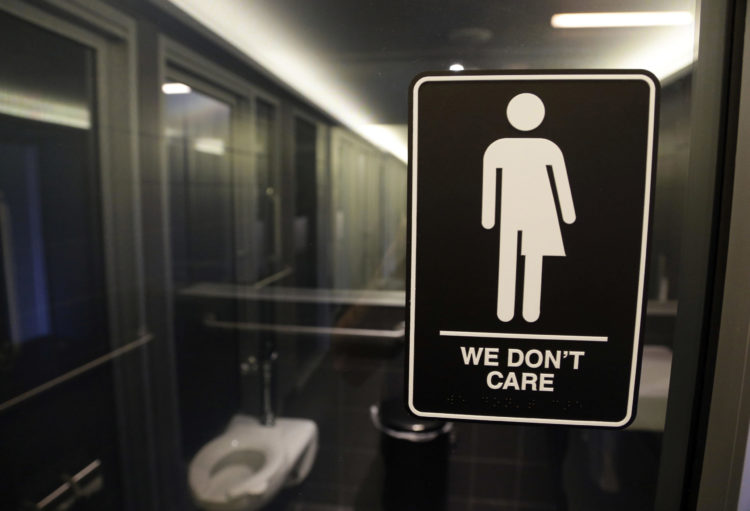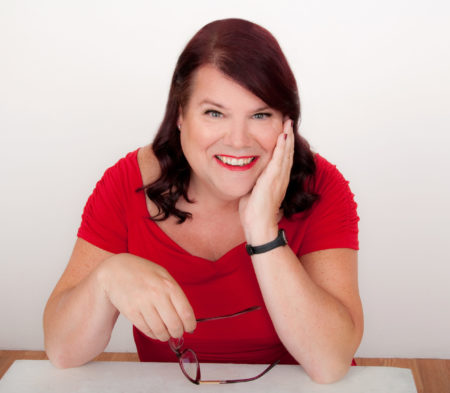
A sign denotes a universal-access bathroom in a hotel in Durham, N.C., in 2016. North Carolina has been home to continued court battles over it's so-called "bathroom bill."
EDITOR’S NOTE: This week, in honor of Pride Month, we feature three posts about transgender issues. Read how Lane DeGregory of the Tampa Bay Times handled a profile in 2002, when there were few other journalistic models or guides, of a transgender woman dealing with challenges to transition. Samantha Schmidt of The Washington Post follows a transgender teenager loses her confidence during COVID isolation because she fears being defined by the sound of her voice. Finally, below, Bethany Grace Howe, a teacher and former journalist, talks about her own transition and offers tips about what other journalists need to know when writing about transgender people.
After a time, student journalists got tired of interviewing me.I was boldly out as a transitioning woman getting my Ph.D. at the University of Oregon. Budding writers flocked to me as an easy-to-get interview about a hot topic. I very quickly got bored of the same questions, so I decided to entertain myself a bit. Here’s an example:
- Student: “What is your opinion on bathrooms?”
Me: “I think they’re awful. With the tuition you’re paying, you should at least get two-ply tissue. If you’re paying out-of-state tuition, you should demand the full Charmin.”
Student: “Huh. OK…Are you seeing a doctor?”
Me: “Every week. In fact, I haven’t missed an episode of ‘Grey’s Anatomy’ in 16 years.”
As you might imagine, they aren’t as amused as I am by these answers.
But my cheeky responses have value. For one, they’re all true. (Seriously, $36,000 a year, and we give them generic toilet paper?) Better, my young padawans might actually learn something: I am more than just the same curiosity-seeking questions about my identity.
It’s a lesson I think more journalists should heed, no matter where they are in their careers. Remember that old cliché? “I’ve heard ’em all.” When it comes to meaningful questions about what it means to be a transgender person, I haven’t heard nearly enough.
In just five-plus years as an out transgender woman, I’ve had multiple tours through Andy Warhol’s 15 minutes of fame. I’ve been out to breakfast with the first transgender billionaire on the planet, and had dinner with arguably the most famous one. I’ve strutted in my heels to a fancy Beverly Hills party and kicked off those heels in a Manhattan penthouse.
It’s been quite a ride. And if you still want to know my opinion on bathrooms? They were all very nice. (Yes, I tipped the attendant in New York City.)
Beyond the usual stereotypes
Far too often I find the discussion about transgender people is reduced to how we conflict with societal norms, or how we try to conform to them. We’re viewed not as the complex individual people we are, but as convenient archetypes for a greater story that “needs” to be told.

Bethany Grace Howe
Certainly, as someone who’s taught journalists at both the universities of Missouri and Oregon, I encouraged my students to tell stories about people unknown to most. As a reporter and writer, from my small hometown paper to the Huffington Post to academic publications like The Lancet Psychiatry, I don’t want to diminish the importance of these stories. The horrific epidemic of violence and murder of transgender women — particularly BIPOC women — warrants far more coverage than it gets. On the flip side of that same coin, however, is a question a Black transgender woman asked me once: “When do we get to be in stories where we’re alive?”
It’s a balancing act, to be sure. Even those student journalists I teased were trying to tell a story they truly felt needed to be told. Accordingly, here are a few things I’d recommend if you’re thinking about how to tell transgender stories:
Not all of us lived or live dysphoric lives. After I came out, I had a number of people tell me how badly they felt for the “endless pain” that I must have endured over the years. That’s nice of them — but not even remotely true.
I lived a normal, happy, cisgender life until I was 47 years old, and then a switch flipped in my head: BOOM; I knew. Is that the normal story? It is not. But it’s not as atypical as you think. Depending on the study you read, up to one-third of transgender people didn’t recognize their transgender identity until adulthood — and many of us were pretty happy along the way.
Another fallacy: All transgender people seek — or even need — medical intervention to become the people they “know” themselves to be. Only one in three transgender people have surgically transitioned, and one in seven say they never intend to. One in five do not seek hormone therapy. Some of this gap is due to inferior access to medical care. Many transgender people want to do more; they simply can’t afford to do it and/or access it.
The point, however, remains the same: One’s transgender identity is in no way related to what one does or does not do medically. I started taking hormones on Dec. 8, 2015 — and I was no more a woman on Dec. 9. I had a vulvaplasty on June 2, 2018 — and I was no more a woman on June 3. I’m transgender because I know I am, not because a doctor made me that way. (I do, however, use a lot more toilet paper these days.)
Another thing: not all of us view every transgender issue the same way. I have friends who are militant about abandoning the names and nicknames given to them at birth, and being referred to by their correct or chosen pronouns. They have spent a lifetime with relatives and friends using the wrong pronoun as a weapon to deny their transgender identity. The name they were given at birth — their “dead name”— is hurled at them loudly or whispered to them quietly, for one reason: to cause them pain. No one should be surprised that they would rise up in defiance to demand correct pronouns and names, or that they might question even transgender people who will not defend themselves in such a manner.
And yet I will not. My dad called me “Buddy” both before I transitioned and after. It was a term of endearment from a man who supported everything I ever did, including transitioning. It was the last word he said to me before he died earlier this year.Pronouns, enlistment in the military, political parties: We’re as diverse a group as any other. Don’t assume you know what we believe. Ask us about these issues as you would any other person.
Finally, and this is a biggie: There is nothing wrong with us. I know this seems obvious; morally, to declare anything else would be vile. But far too often, stories of transgender people are about our pain, our struggles and our battle to fit into a world that wasn’t made for us.I get this. Research says transgender kids who are supported by their parents are highly unlikely to try and die by suicide, while kids who are not supported in this manner probably will. Among adults, it’s not that being transgender makes you depressed; it’s that fighting cisgender society does.
Here’s the thing, though: I am more than my struggles. I am more than my implicit contrast with society.
Here’s what I am: A parent. A doctor of philosophy. I believe that driving anything less than a bright red convertible is denying yourself joy. I hate doing housework these days because I keep forgetting to pin back my long hair before I clean the toilet.
So much for not asking me about the bathroom.
Reflecting the world as it really is
As journalists it’s our job to tell stories. It’s how we allow people to make sense of worlds that they might otherwise never know exist.
Just as critical, however, is reflecting the world as it actually is, as complex as it may be.
In the summer of 2015, I was desperately trying to figure out who I was. That switch, flipped, had ignited something in me I could not extinguish.
Everywhere I looked, however, the stories about transgender people were the same: dysphoric since childhood, angry and depressed, family in conflict, all those things. The stories journalists told didn’t include anyone like me, and because I did not see it, I truly believed I could not be it. In journalism’s rush to tell a story that framed all of us, they left out many of us — including me.
It wasn’t until a professor in my graduate program shared peer reviewed research about transgender people with me that I could confirm I even existed in the eyes of the world. I was lucky. I had the education, the privilege, and a four-year fellowship to basically learn about myself and discover a world I knew I was a part of, but could not see nor find.
Most people have only the stories you tell.
So don’t tell them about the bathrooms, or the surgeries, or all of the other things they already know; satisfying some prurient curiosity is cheap stuff. Instead, tell them what happens beyond the pain and the struggle. Tell them about lives wonderfully — if a bit atypically — lived. Heck, tell them about me; I’ve got sassy answers about more than just bathrooms.
Though please don’t call between 8 and 9 on Thursday evenings; “Grey’s Anatomy” is on.
***
Bethany Grace Howe is a freelance writer, stand-up comedienne, and transgender advocate. To pay the bills, she works for the Oregon Department of Human Services helping people recover from 2020’s devastating Echo Mountain Fire in Otis, Oregon. An area filled with Trump supporters and Libertarians, the people there respect and support her — almost as much as she does them.
